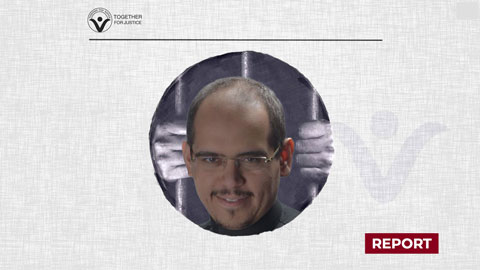Hilal Hussein Al-Qurashi, a prominent Saudi economist and reformist, currently faces a 20-year prison sentence, not for any violent crime or act of rebellion, but for his peaceful efforts to promote economic reform and progress in Saudi Arabia. His arrest and prolonged imprisonment highlight the repressive measures taken by the Saudi regime to stifle any dissenting voices, even when they align with the broader vision of the country’s leadership. The charges against Al-Qurashi are emblematic of a government that increasingly fears and punishes independent thought, transparency, and calls for reform.
The Arrest and Charges Against Al-Qurashi
Hilal Al-Qurashi was arrested in April 2020 as part of a widespread crackdown that targeted activists, journalists, and reformists across the kingdom. His arrest was initially met with shock and confusion, as Al-Qurashi had always been a prominent advocate for Saudi Arabia’s development, particularly through the economic lens of Vision 2030, the government’s ambitious reform plan. However, despite his alignment with these goals, the authorities saw his independent initiatives and reformist ideas as a threat.
Al-Qurashi was initially sentenced to 4 years in prison by Saudi Arabia’s Specialized Criminal Court. However, upon appeal, the sentence was drastically increased to 20 years without any clear legal explanation. The charges levied against him are particularly alarming for their trivial and arbitrary nature. These include:
Traveling to Qatar and Turkey, both of which are nations with diplomatic ties to Saudi Arabia.
Marrying a foreign woman without obtaining official permission from the authorities.
Being accused of affiliation with a banned organization, without clear evidence to support this claim.
Possessing restricted material on his mobile phone.
These charges, especially those related to travel, underscore the regime’s deep-rooted paranoia. While Saudi Arabia reconciled with Qatar in 2021, following a three-year blockade, Al-Qurashi remains in prison for traveling to a nation with which diplomatic relations have been restored. His travel to Turkey, another nation with which Saudi Arabia maintains diplomatic ties, further illustrates the irrationality behind his conviction.
A Reformer Punished for Progress
Hilal Al-Qurashi was not an individual seeking to undermine the Saudi state or its leadership. In fact, his work revolved around supporting the country’s economic growth and development. His most notable initiative was the founding of “The Third Bank”, a non-profit platform aimed at empowering the non-profit sector to play a significant role in Saudi Arabia’s Vision 2030. The platform sought to encourage innovation, knowledge-sharing, and collaboration within the country’s economic and social systems, aligning with Crown Prince Mohammed bin Salman’s stated vision for modernizing the country.
However, sources suggest that Al-Qurashi’s reformist initiatives were viewed as too independent, leading to his persecution. In Saudi Arabia, reforms that do not originate directly from the crown prince or the ruling elite are often seen as challenges to their authority. Al-Qurashi’s arrest appears to be part of a larger pattern in which the government silences those whose progressive ideas do not align with the regime’s strict control over reforms and discourse.
Deteriorating Health and Inhumane Conditions
Since his imprisonment, Hilal Al-Qurashi’s health has deteriorated significantly, raising serious concerns about his treatment in prison. He is currently held in Al-Ha’ir Prison in Riyadh, a facility notorious for its harsh conditions and human rights violations. Reports from human rights organizations indicate that Al-Qurashi has been denied proper medical care, despite suffering from severe health issues.
Al-Qurashi has lost vision in his right eye, a condition that could have been prevented with timely medical intervention. In addition, he has developed diabetes and suffers from chronic hypertension. These health conditions require careful monitoring, a healthy diet, and appropriate medical treatment—none of which he has received in prison. Instead of providing the necessary care, the authorities have refused to transfer him to a specialized hospital or allow his family to cover the cost of treatment at an external facility.
The denial of medical care is a form of psychological and physical torture, aimed at breaking prisoners’ spirits and prolonging their suffering. Hilal Al-Qurashi’s case is a clear violation of international human rights standards, which guarantee the right to adequate healthcare, even for prisoners. The conditions he faces in Al-Ha’ir Prison are catastrophic, and his situation continues to worsen.
The Need for International Action
Hilal Al-Qurashi’s case is emblematic of the Saudi regime’s broader efforts to crush dissent and silence any voices advocating for meaningful reform. His unjust imprisonment, the severe deterioration of his health, and the inhumane conditions he faces in prison demand urgent international attention. Governments, human rights organizations, and international bodies must act to hold Saudi Arabia accountable for its ongoing human rights violations.
The international community should:
Demand the immediate release of Hilal Al-Qurashi and other prisoners of conscience held on politically motivated charges.
Condemn the use of arbitrary detention, torture, and denial of medical care as tools of repression in Saudi Arabia.
Pressure the Saudi regime to allow independent international inspections of prison conditions and ensure compliance with international human rights standards.
The silence of the international community only emboldens the Saudi regime to continue its oppressive practices. The world must speak out against the ongoing injustices faced by Hilal Al-Qurashi and others like him. Without sustained pressure, reformist voices in Saudi Arabia will continue to be silenced, and the country’s potential for meaningful progress will remain stifled by fear and repression.
The time for international intervention is now—before more reformers like Hilal Al-Qurashi are silenced forever.

